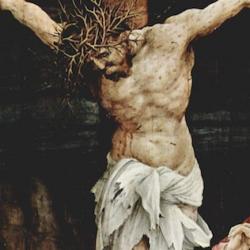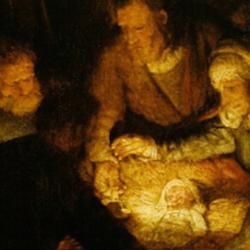Micah’s prophecy begins with an advent, a theophany, of Yahweh. Yahweh rises from His palace-temple (1:2) to tread down the heights of the earth (1:3). At His coming, this too too solid world melts and turns watery, formless and void (1:4).
Mountains represent highly-placed people who are going to be brought low. Alternatively, mountains may represent Israel and Judah, the high places where the Israel lives and worships. At Yahweh’s coming, the mountains that make up Israel and Judah are going to melt like wax, and flow away like water, away into the Gentile sea.
Yahweh marches from His throne in the North to thrown down Samaria (1:6), and then moves on to Jerusalem (1:5, 9, 12). Micah lists a series of towns that Yahweh passes through on his procession and puns on each name in the list (1:10-15).
In the “house of dust,” Israel will return to dust and roll in the dust. Shaphir means “pleasantness,” but the pleasantness of the city will be turned to shame and nakedness. Zaanan means “go out,” but they will not go out. At the “house of removal” the Lord will remove the supports of Israel.
Micah takes up a funeral lament for the dead nation of Judah (vv. 8, 16). Yahweh’s advent brings death to a rebellious nation.
Samaria is guilty of idolatry. Her temples are filled with the wages of spiritual prostitution (1:6-7). Because of Samaria’s sins, Yahweh turns Samaria into a heap of ruins and spreads out the stones of her walls and buildings throughout the valley. Yahweh whirls through like a tornado, smashing houses and shrines and idols. He burns like a raging fire, consuming all that Samaria has gathered by her idolatrous worship.
When Micah turns to Judah’s sins, he focuses on social injustices. The wealthy barons of Judah scheme on their beds to take away a man’s inheritance (2:1-2). Inheritances in Israel were to be permanent. When the land was divided at the time of Joshua, each clan and family received a portion, and that portion was to be inalienable. Now, Micah says, Judah is full of those who covet the land of their neighbors and plot to take it. Judah has become a nation of tin-pot Ahabs (cf. 1 Kings 21).
They treat their neighbors like enemies, plundering them as if they were at war (2:8). They evict widows from their houses and abuse the children of widows (2:9). Judah was supposed to be a place of Sabbath, offering rest for the oppressed, but Judah has so defiled the land that it will expel them into exile (2:10).
They were redeemed from slavery in Egypt, and was supposed to be the people of the Exodus, a people of liberation. Yahweh commanded them to remember what it was like to be oppressed and to renounce oppression. But Judah has become a mirror image of all the Gentile nations. Because of this, Yahweh threatens to take the portions from the people, take their land and give it to others. They have plundered land, so the Lord will plunder theirs.
Judah adds to her sins by resisting Micah’s prophetic indictment. 2:6-7 record an exchange between prophet and people. The people of Judah want Micah’s words to stop “flowing” (v. 6). They believe they are above condemnation: Yahweh the patient and longsuffering would never destroy His own people(v. 7).
Israel has misconstrued Yahweh’s character, and forgotten much of their own history, which is largely a history of Yahweh’s jealous wrath against His people.
Micah 5 contains one of the best-known Messianic prophecies in the Old Testament, the prophecy that the Messiah will come from Bethlehem. Herod’s scribes are reading Micah when they inform the magi that the newborn King of the Jews is in Bethlehem, not Jerusalem.
It’s an ironic scene: Herod exemplifies everything that Micah attacks; when his scribes read from Micah, they are self-condemned.
The early chapters of Micah are essential for understanding the nature of Jesus’ Messianic work. In a world where wealthy land barons plot to take more and more land, defrauding and intimidating and oppressing, in that world, Isaiah says, “Unto us a child is born unto us a son is given.”
In a world where the powerful evict widows and orphans and leave them bereft, in that world, Isaiah says “A virgin will conceive and bear a son and call his name Immanuel.”
In a world where neighbor strips neighbor and a man’s enemies are members of his own household, in that world, Micah says, “But you, Bethlehem Ephrata, though you be little among the princes of Judah, yet out of shall come One who will be ruler in Israel.”












